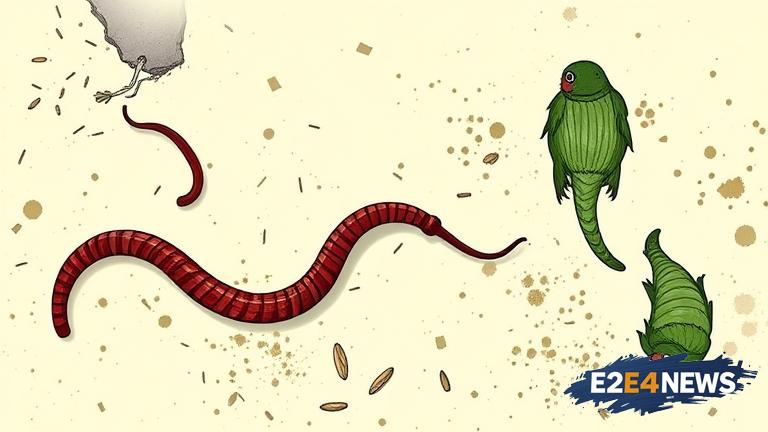A recent outbreak of screwworms has been confirmed in the United States, with the US Department of Agriculture (USDA) reporting cases in the country. Meanwhile, in Belize, two human cases of screwworm infection have been reported, sparking concerns over the potential spread of the parasite. Screwworms are a type of fly larvae that can infect mammals, including humans, and cause significant harm. The larvae feed on the host’s flesh, leading to severe tissue damage and potentially life-threatening complications. The USDA has confirmed that the screwworms found in the US are of the Cochliomyia hominivorax species, which is typically found in tropical and subtropical regions. The agency has implemented measures to contain the outbreak, including the establishment of a quarantine zone and the distribution of insecticides. In Belize, the two human cases of screwworm infection were reported in the southern part of the country, near the border with Guatemala. The patients, who have not been named, are currently undergoing treatment and are expected to make a full recovery. The Belize Ministry of Health has issued a statement assuring the public that the situation is under control and that measures are being taken to prevent further spread of the parasite. The ministry has also warned the public to take precautions to avoid infection, including wearing protective clothing and avoiding contact with potentially infected animals. Screwworms are typically spread through the bites of infected flies, which can pick up the larvae from contaminated soil or water. The larvae can then be deposited into the wound, where they feed on the host’s flesh. The infection can cause a range of symptoms, including pain, swelling, and discharge from the wound. In severe cases, the infection can lead to sepsis, organ failure, and even death. The USDA has warned that the screwworm outbreak poses a significant threat to the US livestock industry, with the potential to cause significant economic losses. The agency has urged farmers and ranchers to take precautions to protect their animals, including using insecticides and maintaining good hygiene practices. The outbreak has also raised concerns over the potential impact on human health, particularly in areas where the parasite is common. The Centers for Disease Control and Prevention (CDC) has issued a statement advising travelers to areas where screwworms are common to take precautions to avoid infection. The CDC has also warned that the parasite can be spread through contact with contaminated soil or water, and has advised people to avoid touching their eyes, nose, or mouth after handling potentially infected animals. The screwworm outbreak has sparked concerns over the potential for the parasite to spread to other parts of the world, particularly in areas with tropical or subtropical climates. The World Health Organization (WHO) has issued a statement warning of the potential risks associated with the parasite, and has urged countries to take precautions to prevent its spread. The WHO has also advised people to be aware of the symptoms of screwworm infection and to seek medical attention immediately if they suspect they have been infected. In conclusion, the screwworm outbreak in the US and Belize has sparked concerns over the potential spread of the parasite and the impact on human and animal health. The USDA, CDC, and WHO have all issued warnings and advisories, and have urged people to take precautions to avoid infection. As the situation continues to unfold, it is essential to remain vigilant and to take all necessary precautions to prevent the spread of this potentially deadly parasite.
